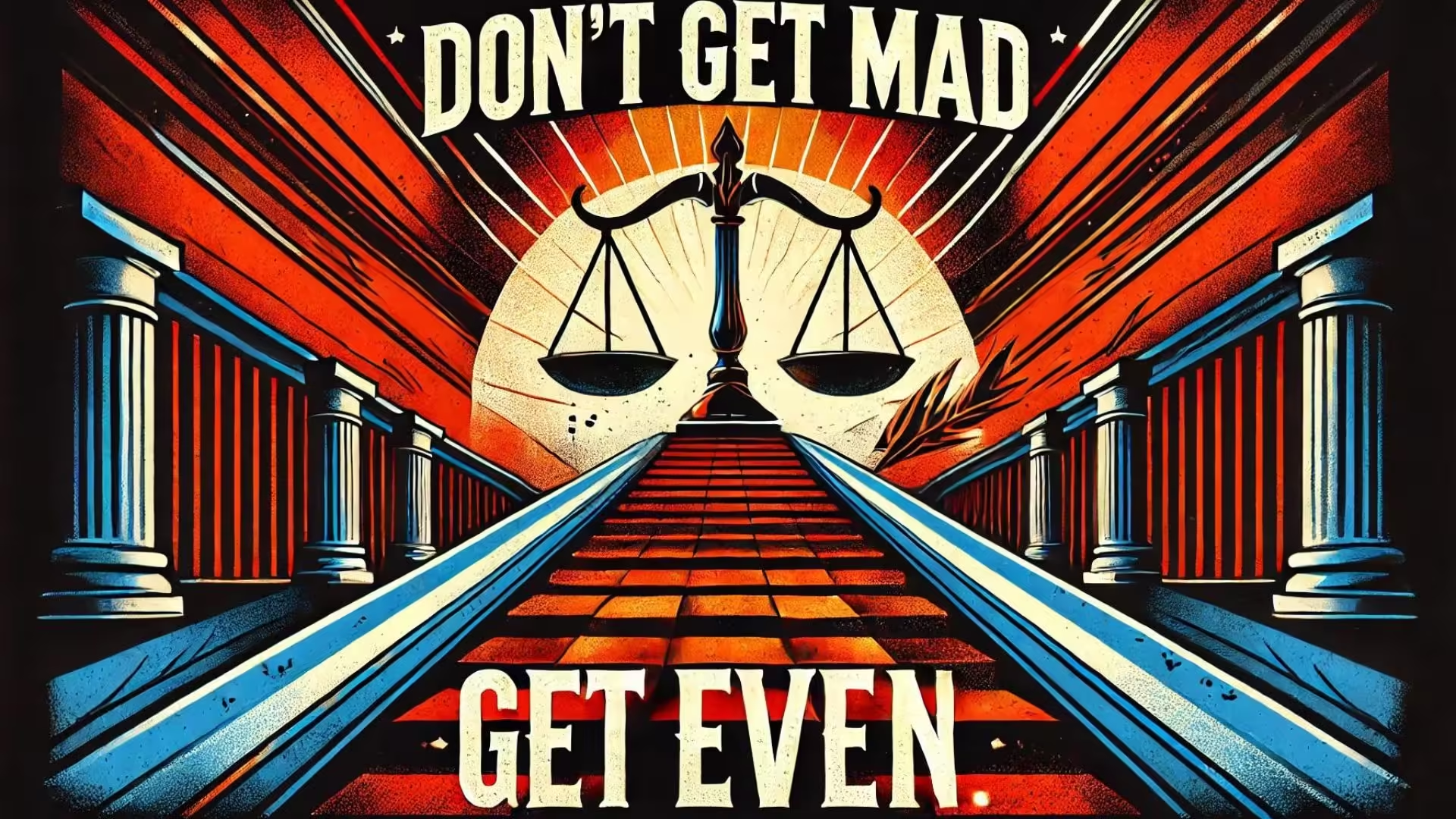The idiom “Don’t get mad, get even” is often used to suggest that instead of reacting emotionally to a wrong or injustice, one should focus on getting back at the person or situation that caused the harm. The idea is that retaliation or seeking justice can be more satisfying than simply expressing anger. While this phrase can be empowering in certain contexts, it also has the potential to encourage vengeful behavior, which may not always be the best course of action.
The Meaning Behind the Idiom
At its core, “Don’t get mad, get even” emphasizes the idea of taking control of a situation rather than being overwhelmed by anger. It suggests channeling negative emotions into a calculated response that ensures you regain power or balance. However, it’s essential to recognize that this idiom carries a subtle implication of revenge, which may not align with everyone’s values or the specific context of the situation.
When to Use “Don’t Get Mad, Get Even”
- Overcoming Obstacles with Determination: This idiom can be motivational when used to encourage someone to rise above a setback. Instead of dwelling on the injustice, it suggests focusing on succeeding in spite of it. This application of the idiom promotes perseverance and resilience.
Example: If someone loses a promotion at work due to unfair treatment, you might say, “Don’t get mad, get even—use this as fuel to excel even more and prove your worth.”
- Turning a Negative into a Positive: The phrase can also be used to encourage someone to turn a negative situation into a positive outcome by achieving success or finding justice in a constructive way. It’s about using the situation to your advantage rather than letting it defeat you.
Example: After being underestimated in a competition, a friend could be encouraged with, “Don’t get mad, get even—show them what you’re truly capable of.”
- Seeking Justice or Fairness: In some contexts, the idiom can imply seeking justice in a fair and balanced manner rather than resorting to impulsive anger. This usage is more about righting a wrong than exacting revenge.
Example: If a colleague spreads false rumors about you, instead of reacting with anger, you could focus on clearing your name and restoring your reputation, embodying the idea of “getting even.”
When Not to Use “Don’t Get Mad, Get Even”
- Promoting Revenge or Negative Behavior: The idiom’s undertone of revenge can be harmful if taken literally. In situations where forgiveness or moving on would be more appropriate, using this phrase might encourage destructive behavior.
Example: If someone has been wronged in a personal relationship, saying “Don’t get mad, get even” could lead to further conflict rather than resolution. It’s often better to seek reconciliation or let go of the anger.
- In Situations Requiring Empathy: When someone is dealing with a sensitive or emotionally charged situation, they may need empathy and support rather than encouragement to retaliate. In such cases, using this idiom could come across as dismissive of their feelings.
Example: If a friend is grieving a loss or dealing with a serious personal issue, saying “Don’t get mad, get even” would likely be inappropriate and insensitive. A more compassionate response would be better suited.
- When Focusing on Personal Growth: The idiom can sometimes shift the focus away from personal growth and healing. Instead of holding onto anger and plotting revenge, it’s often healthier to focus on self-improvement and moving forward.
Example: If someone is trying to improve themselves after a difficult experience, advising them to “get even” might hinder their progress. Encouraging them to focus on their own growth and well-being would be more constructive.
Real-Life Examples
- Workplace Challenges: After being passed over for a promotion, instead of getting angry, someone might channel their frustration into performing even better at their job, eventually earning a higher position. This reflects the idiom’s spirit of turning anger into action.
Example: “She didn’t let the rejection get to her—instead, she worked harder, and now she’s in a better role. She truly embodied the idea of ‘Don’t get mad, get even.'”
- Competitive Sports: An athlete who loses a match due to unfair circumstances might use the defeat as motivation to train harder and win the next competition, embodying the idea of “getting even” by proving their abilities.
Example: “He didn’t dwell on the unfair loss. Instead, he trained harder and won the next championship—’Don’t get mad, get even’ in action.”
- Personal Relationships: While the idiom might seem applicable in personal relationships, it can often do more harm than good. Seeking revenge on a partner or friend for a perceived slight can lead to a cycle of negativity, which is why it’s essential to consider whether this phrase is appropriate in such contexts.
Example: “Instead of getting even with her friend who hurt her, she chose to have an open conversation and mend the relationship.”
“Don’t get mad, get even” is a powerful idiom that encourages us to take control of situations rather than succumb to anger. However, it’s important to recognize when this phrase might promote unhealthy behavior or negative outcomes. In some cases, focusing on personal growth, empathy, or forgiveness may be more beneficial. By understanding when to apply this wisdom, you can use it to empower yourself in a constructive way without letting it lead to destructive actions.
Expand Your Vocabulary
In this section, we’ll explore key words and expressions from the article “Don’t Get Mad, Get Even.” Understanding these terms will not only enhance your vocabulary but also help you grasp the nuances of the idiom in different contexts.
- Retaliation: This word refers to the act of responding to an injury or wrong by inflicting harm or seeking revenge. In everyday use, retaliation can be seen in situations where someone feels wronged and decides to take action against the person who caused the harm. For example, “He faced retaliation after criticizing his colleague’s work.”
- Perseverance: This is the persistence in doing something despite difficulty or delay in achieving success. The article uses it in the context of overcoming obstacles and continuing to strive toward a goal. In daily life, you might say, “Her perseverance helped her finish the marathon, even when she wanted to quit.”
- Resilience: This term refers to the ability to recover quickly from difficulties. Resilience is essential when using the idiom “Don’t get mad, get even” in a positive way, focusing on bouncing back stronger. For example, “His resilience after losing his job was admirable—he started his own business and thrived.”
- Empathy: Empathy is the ability to understand and share the feelings of another person. The article highlights the importance of empathy in situations where revenge might not be the best response. For example, “She showed great empathy by listening to her friend’s concerns without judgment.”
- Reconciliation: This word means the restoration of friendly relations. In the article, reconciliation is suggested as a better alternative to getting even in some situations. You might use it in daily conversations like, “After their argument, they both sought reconciliation and repaired their friendship.”
- Vengeful: Being vengeful means having or showing a strong desire for revenge. The article warns against adopting a vengeful attitude, as it can lead to negative consequences. For instance, “His vengeful actions only made the situation worse.”
- Calculated Response: This phrase refers to a carefully thought-out reaction to a situation. The article suggests that instead of reacting emotionally, a calculated response might be more effective. In everyday language, you could say, “She gave a calculated response during the negotiation, which helped her secure a better deal.”
- Justice: Justice is the concept of fairness and the administration of the law. The article touches on seeking justice as a form of “getting even” in a fair manner. In daily use, you might hear, “The victims are still waiting for justice to be served.”
- Self-Improvement: This term refers to the process of making oneself better through learning, growth, and development. The article suggests that focusing on self-improvement might be a better path than seeking revenge. For example, “He dedicated himself to self-improvement after the setback and came back stronger.”
- Channeling: Channeling means directing or guiding something, often energy or emotions, into a particular action. The article mentions channeling negative emotions into constructive actions. You might say, “She channeled her frustration into creating art.”
By integrating these words and expressions into your vocabulary, you’ll be better equipped to understand and apply the idiom “Don’t get mad, get even” in various contexts.
Let’s Talk
Now that you’ve explored the meaning and implications of the idiom “Don’t get mad, get even,” let’s dive deeper with some thought-provoking questions. These questions are designed to encourage reflection on the article and spark meaningful discussions. Feel free to share your thoughts in the comments section or discuss them with friends and family.
- Have you ever experienced a situation where you were tempted to “get even”? How did you handle it, and what did you learn from the experience?
- In your opinion, when is it more beneficial to seek reconciliation rather than retaliation? Can you think of a specific example from your life or the lives of others?
- How do you balance the desire for justice with the need for empathy in challenging situations?
- Do you believe that “getting even” can ever lead to positive outcomes, or do you think it always results in more negativity? Why?
- Have you ever seen someone turn a negative situation into a positive one by focusing on self-improvement rather than revenge? How did their approach inspire you?
- What role does resilience play in overcoming obstacles without resorting to vengeful behavior? How can you cultivate resilience in your own life?
- How can we teach younger generations the importance of choosing empathy and reconciliation over revenge? What lessons can we impart to help them navigate conflicts?
- Can you think of a time when a calculated response helped you achieve a better outcome than an emotional reaction? How did this experience shape your approach to conflict?
- What are some ways you can channel negative emotions into constructive actions, both in your personal and professional life?
- In what situations do you think the idiom “Don’t get mad, get even” might be misinterpreted or lead to unintended consequences? How can we ensure we’re using it wisely?
Reflecting on these questions can help deepen your understanding of the idiom and its relevance in modern life. Engaging in these discussions will also allow you to see different perspectives and learn from others’ experiences.











0 Comments